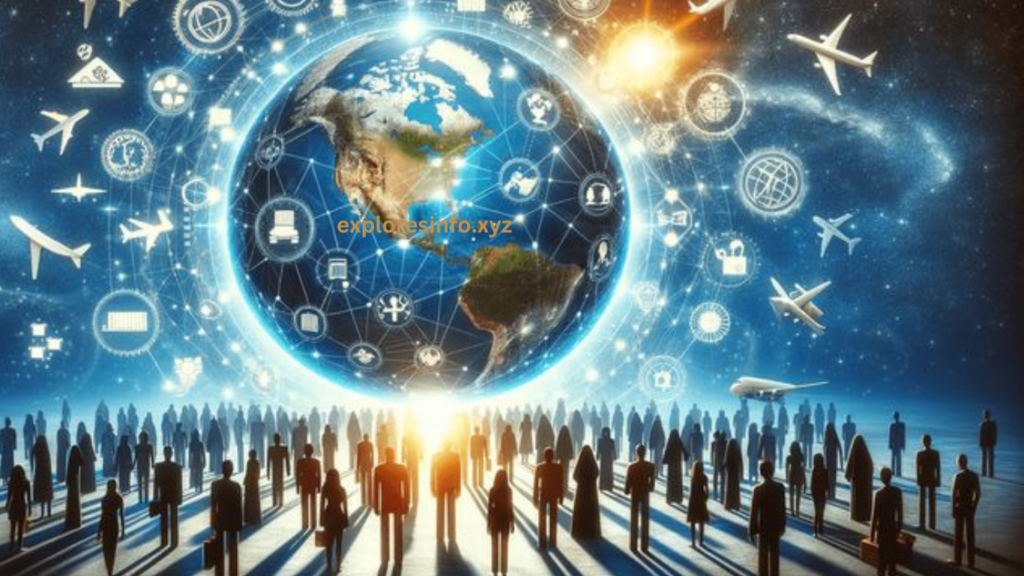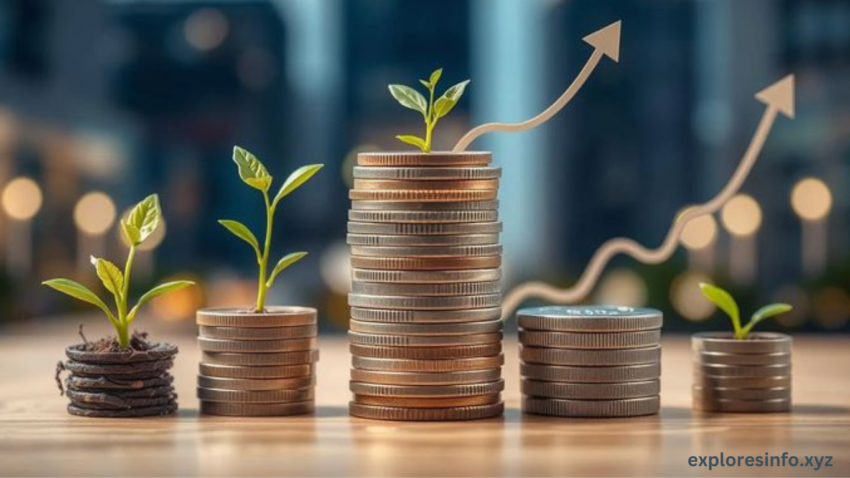In today’s interconnected world, economic challenges are not just abstract concepts discussed in boardrooms or academic papers—they are real, tangible issues that affect everyday lives. From the rising cost of groceries to the widening gap between the rich and the poor, and the unpredictable shifts in global markets, these challenges shape how we live, work, and plan for the future. This article explores three critical economic issues—inflation, inequality, and global uncertainty—and how they impact individuals, families, and communities. By humanizing these complex topics, we can better understand their effects and explore ways to navigate them.
1. Inflation: The Rising Cost of Living
Inflation is often described as the general increase in prices over time, but for most people, it’s much more personal. It’s the feeling of dread at the grocery store when the price of bread, milk, or eggs has gone up again. It’s the frustration of realizing that your paycheck doesn’t stretch as far as it used to. Inflation is not just an economic indicator; it’s a daily struggle for millions.
The Human Impact of Inflation
Imagine Sarah, a single mother of two living in a small town. She works full-time as a nurse, but her salary hasn’t kept up with the rising costs of rent, utilities, and childcare. Every month, she has to make difficult choices: Does she pay the electricity bill or buy new shoes for her kids? Does she fill up her car with gas or skip a meal to save money? For Sarah, inflation isn’t just a statistic—it’s a constant source of stress and anxiety.
Inflation hits hardest those who are already vulnerable: low-income families, fixed-income retirees, and small business owners. When prices rise faster than wages, people are forced to cut back on essentials, dip into savings, or take on debt just to make ends meet. This creates a cycle of financial insecurity that can be difficult to break.
What’s Driving Inflation?
Several factors contribute to inflation, including supply chain disruptions, increased demand for goods and services, and rising energy costs. The COVID-19 pandemic played a significant role, as lockdowns and labor shortages disrupted production and distribution. More recently, geopolitical tensions, such as the war in Ukraine, have driven up the cost of oil and gas, further fueling inflation.
Central banks, like the Federal Reserve in the U.S., often respond to inflation by raising interest rates. While this can help cool down the economy, it also makes borrowing more expensive, affecting everything from mortgages to credit card payments. For people like Sarah, higher interest rates mean even tighter budgets.
Navigating Inflation
While individuals have little control over macroeconomic policies, there are steps they can take to mitigate the impact of inflation. Budgeting, cutting non-essential expenses, and seeking out discounts or bulk purchases can help stretch limited resources. On a broader scale, governments can support vulnerable populations through targeted subsidies, tax relief, and investments in affordable housing and healthcare.
2. Inequality: The Growing Divide Between the Rich and the Poor
It’s not just about wealth disparities; it’s about access to opportunities, education, healthcare, and a decent standard of living. Inequality affects where people live, the schools they attend, and even how long they live.

The Human Face of Inequality
Consider the story of Carlos, a factory worker in a mid-sized city. He works long hours for a modest wage, barely enough to cover his rent and support his family. Meanwhile, the CEO of the company he works for earns hundreds of times more, enjoying perks like stock options, bonuses, and a lavish lifestyle. Carlos dreams of sending his kids to college, but with tuition costs soaring, that dream feels increasingly out of reach.
Inequality isn’t just about income—it’s about systemic barriers that prevent people from climbing the economic ladder. Factors like race, gender, and geography play a significant role in determining who succeeds and who struggles. For example, women and minorities often face wage gaps and limited access to high-paying jobs, while rural areas may lack the infrastructure and resources needed to attract investment and create jobs.
The Consequences of Inequality
High levels of inequality can lead to social unrest, political polarization, and a loss of trust in institutions. It can also stifle economic growth, as those at the bottom of the income ladder have less money to spend and invest. Inequality isn’t just unfair; it’s unsustainable.
Addressing Inequality
Tackling inequality requires a multi-faceted approach. Policies like raising the minimum wage, expanding access to education and healthcare, and investing in underserved communities can help level the playing field. Tax reforms that ensure the wealthy pay their fair share can also generate revenue for social programs that benefit everyone.
On an individual level, supporting local businesses, advocating for fair wages, and volunteering in your community can make a difference. Inequality is a systemic issue, but collective action can drive meaningful change.
3. Global Uncertainty: Navigating a Volatile World
In an increasingly interconnected world, events in one country can have ripple effects across the globe. From trade wars and pandemics to climate change and political instability, global uncertainty is a defining feature of the modern era. For individuals and businesses alike, this uncertainty can make planning for the future feel like navigating a minefield.
The Human Cost of Global Uncertainty
Take the example of Priya, a small business owner who runs a boutique selling handmade clothing. When the pandemic hit, her supply chain was disrupted, and her sales plummeted. Just as she was starting to recover, rising shipping costs and inflation ate into her profits. Now, with the threat of a recession looming, Priya is unsure whether she can keep her business afloat.
Global uncertainty affects everyone, but it’s particularly challenging for small businesses, freelancers, and workers in industries like tourism and manufacturing. It can lead to job losses, reduced incomes, and a sense of instability that makes it difficult to plan for the future.
Sources of Global Uncertainty
Several factors contribute to global uncertainty, including:
- Geopolitical Tensions: Conflicts, trade disputes, and shifting alliances can disrupt markets and create instability.
- Climate Change: Extreme weather events, rising sea levels, and resource scarcity pose significant risks to economies and livelihoods.
- Technological Disruption: While innovation drives progress, it can also lead to job displacement and widen the digital divide.
- Pandemics: COVID-19 highlighted how vulnerable the global economy is to health crises.
Navigating Global Uncertainty
While it’s impossible to predict the future, there are ways to build resilience in the face of uncertainty. Diversifying income streams, saving for emergencies, and staying informed about global trends can help individuals and businesses adapt to changing circumstances. Governments and international organizations also play a crucial role in promoting stability through diplomacy, disaster preparedness, and sustainable development.

Conclusion: A Path Forward
Inflation, inequality, and global uncertainty are complex challenges, but they are not insurmountable. By understanding their human impact and working together to address their root causes, we can create a more equitable and resilient world. This requires not only policy changes but also a shift in mindset—one that prioritizes people over profits and long-term sustainability over short-term gains.
For individuals, navigating these challenges means staying informed, advocating for change, and supporting one another. For governments and institutions, it means implementing policies that promote fairness, stability, and opportunity for all. Together, we can build a future where economic challenges are met with compassion, creativity, and collective action.
Frequently Asked Questions (FAQs) About Economic Challenges: Inflation, Inequality, and Global Uncertainty
Here are some common questions people might have about the economic challenges discussed in the article, answered in simple, human terms:
1. What is inflation, and why does it matter to me?
Inflation is when the prices of everyday things—like food, gas, and rent—go up over time. It matters because it affects how far your money can stretch. If your paycheck stays the same but prices keep rising, you might have to cut back on things you need or want. For example, if a loaf of bread costs 3todaybut3todaybut5 next year, you’ll feel the pinch every time you go grocery shopping.
2. Why are prices rising so fast right now?
Prices are rising for a few reasons:
- Supply chain problems: During the pandemic, factories shut down, and shipping got delayed, making it harder to produce and deliver goods.
- Higher demand: As people started spending more after lockdowns, there wasn’t enough supply to meet the demand, so prices went up.
- Energy costs: Wars and conflicts, like the one in Ukraine, have driven up the cost of oil and gas, which affects everything from transportation to heating your home.
3. How does inflation affect people differently?
Inflation doesn’t hit everyone the same way. If you’re living paycheck to paycheck, even a small price increase can be a big problem. For example, a single parent might have to choose between buying groceries or paying the electric bill. On the other hand, someone with a stable job and savings might feel the impact less. Retirees on fixed incomes are also hit hard because their pensions or savings don’t grow with inflation.
4. What is economic inequality, and why should I care?
It’s not just about money—it’s about opportunities. For example, a child born into a wealthy family might have access to better schools, healthcare, and job opportunities, while a child from a low-income family might struggle to get ahead. Inequality matters because it affects everyone. When too many people are left behind, it can lead to social unrest, slower economic growth, and a less stable society.
5. Why is inequality getting worse?
Inequality is growing for several reasons:
- Wage gaps: The rich are getting richer, while wages for many workers have stayed the same or grown very slowly.
- Automation and technology: Jobs in manufacturing and other industries are being replaced by machines, leaving many workers without stable employment.
- Tax policies: In some places, the wealthy pay a smaller percentage of their income in taxes than the middle class, which can widen the gap.
6. How does global uncertainty affect my daily life?
Global uncertainty can feel overwhelming, but it shows up in small, everyday ways. For example:
- Job security: If your company relies on imports or exports, a trade war or supply chain issue could put your job at risk.
- Prices: Conflicts or natural disasters in other parts of the world can drive up the cost of goods like gas or electronics.
- Savings: Stock market swings or a recession could affect your retirement savings or investments.
7. What can I do to protect myself from inflation?
While you can’t control inflation, there are steps you can take to lessen its impact:
- Budget wisely: Track your spending and cut back on non-essentials.
- Save when you can: Even a small emergency fund can help you weather price increases.
- Shop smart: Look for sales, buy in bulk, or switch to cheaper alternatives.
- Invest in skills: Learning new skills or getting a side job can help you earn more money.
8. How can we reduce inequality?
Reducing inequality requires action from both individuals and governments:
- Support fair wages: Advocate for higher minimum wages and better working conditions.
- Invest in education: Access to quality education can help level the playing field.
- Tax reforms: Governments can ensure the wealthy pay their fair share and use that money to fund social programs.
- Community support: Volunteering or donating to local organizations can make a difference in your community.
9. What can I do to prepare for global uncertainty?
Global uncertainty can feel out of your control, but there are ways to build resilience:
- Diversify income: If possible, have multiple sources of income, like a side hustle or freelance work.
- Save for emergencies: Aim to have 3-6 months’ worth of living expenses saved up.
- Stay informed: Keep an eye on global news and trends, but don’t let it overwhelm you.
- Support local businesses: Strengthening your local economy can help your community weather global shocks.
10. Why should we care about these economic challenges?
These challenges—inflation, inequality, and global uncertainty—affect everyone, even if it’s not always obvious. They shape the world we live in, from the cost of living to the opportunities available to us. By understanding and addressing these issues, we can create a fairer, more stable, and more prosperous society for ourselves and future generations.
11. Can one person really make a difference?
Yes! While these challenges are big, change often starts with small actions. Voting for leaders who prioritize economic fairness, supporting local businesses, and helping others in your community are all ways to make a difference. When people come together, they can create powerful movements for change.
12. What’s the most important thing to remember about these issues?
The most important thing to remember is that these aren’t just abstract problems—they’re about real people. Behind every statistic is someone trying to make ends meet, provide for their family, or chase their dreams. By humanizing these issues, we can approach them with empathy and work toward solutions that benefit everyone.
